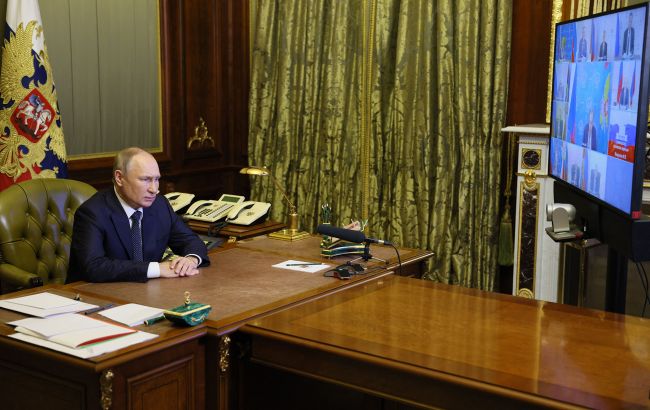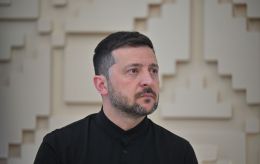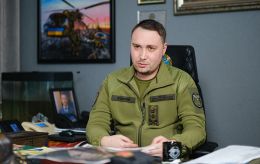Russian elite is souring on Putin’s chances of winning his war
 Putin viewed as a loser (Getty Images)
Putin viewed as a loser (Getty Images)
A mood of deepening gloom is gripping Russia’s elite about prospects for President Vladimir Putin’s war in Ukraine, with even the most optimistic seeing a “frozen” conflict as the best available outcome now for the Kremlin, according to Bloomberg.
Many within the political and business elite are tired of the war and want it to stop, though they doubt Putin will halt the fighting, according to seven people familiar with the situation, who asked not to be identified because the matter is sensitive. While nobody’s willing to stand up to the president over the invasion, absolute belief in his leadership has been shaken by it, four of the people said.
According to two sources, the most favorable prospect would be negotiations by the end of the year that could turn the war into a "frozen" conflict and allow Putin to claim a Pyrrhic victory, retaining some of the seized Ukrainian territory.
"The elite is in a bind: they are afraid of becoming scapegoats for a senseless war," said Kirill Rogov, a former adviser to the Russian government who left the country after the invasion and now heads Re:Russia, an analytical center in Vienna. "It is truly remarkable how widespread the notion has become among the elite that Putin will not win this war."
Despair
The growing despair will most likely intensify the search for those responsible for the botched invasion, which has already sparked bitter societal disagreements between hardline supporters and the Russian Ministry of Defense. As the Kremlin confronted a Ukrainian counter-offensive, backed by billions of dollars' worth of weaponry from the US and Europe, Russian officials had little expectation of any significant battlefield successes after the winter, when Moscow's forces failed to achieve significant victories and suffered heavy losses.
The catastrophic breach of the giant Kakhovka dam, for which the government in Kyiv blamed Russia, further complicated the situation, as parts of the conflict zone have been flooded, Bloomberg notes.
Attacks within Russia are intensifying feelings of insecurity, including drone strikes on Moscow last week. The fighting has spilled over into the Belgorod region bordering Ukraine, which has undermined Putin's image as a guarantor of Russia's security.
Even those who support the invasion and want to step up the fight against Ukraine are disappointed in Russia's prospects in a war that was supposed to end in a few days but has been ongoing for 16 months. Nationalists led by Yevgeny Prigozhin, founder of the Wagner mercenary group, have lashed out at Defense Minister Sergei Shoigu and the commander-in-chief of the Russian army Valery Gerasimov for military failures, insisting on full-scale mobilization and a state of war to prevent further failures.
"There have been a lot of big mistakes," said Sergey Markov, a political consultant with close ties to the Kremlin. "There were expectations a long time ago that Russia would take control of most of Ukraine, which have not been met."
Kremlin's stance
Putin and his senior officials insist that Russia will prevail, even though it's no longer clear what counts as a victory after its army failed to capture Kyiv at the start of the war. Yet there are no signs of doubt about his leadership within his inner circle.
According to four people briefed on the situation, the majority of the elite keep their heads down and continue with their work, convinced that they have no influence over events. According to five sources, Putin shows no signs of wanting to end the war.
State media explains repeated failures with claims that Russia is waging a proxy war in Ukraine against the US and its NATO allies, despite the fact that Putin initiated the unprovoked invasion in February 2022.
The Kremlin has implemented the harshest crackdowns in decades to punish even moderate dissent with prison sentences. The Russian middle class, which has been the backbone of opposition to Putin's rule in major cities over the past decade, has been cowed or fled the country in the biggest wave of emigration since the 1990s following the collapse of the Soviet Union.
Signs of discontent
For now, polls suggest that most ordinary Russians continue to support Putin, who mixes nostalgia for Soviet times with Russia's imperial past, asserting that he is defending the country's interests and reclaiming historic lands by annexing territories in eastern and southern Ukraine.
However, anxiety may resurface after a peak last autumn when Putin announced the mobilisation of 300,000 people. A survey of 1,500 Russians conducted from May 19 to 21 by the Public Opinion Foundation showed that 53% believe their family and friends are in a state of anxiety, up 11 percentage points from April and the highest figure in nearly four months.
Last week, Prigozhin (mercenary chief and a close confidant of Russian president) embarked on a tour of Russian cities, warning of a "hard" war that could drag on for years, as he advocated for martial law and full mobilisation. In an interview last month, he warned that Russia faced a revolution similar to that of 1917, due to a rift between the Kremlin elite and ordinary Russians, whose children are "returning in zinc coffins" from Ukraine.
The ruling United Russia party launched an investigation after senior Duma deputy Konstantin Zatulin stated at a forum that the invasion had not achieved any of its stated goals. "Let's somehow wriggle out of this," Zatulin said.
Konstantin Malofeev, a Russian Orthodox nationalist and Putin supporter, wants Russia to keep fighting because the "Ukrainian state must cease to exist". He rejects any talks of a ceasefire, although he admitted that many members of the ruling elite, including a "huge number" of business people, support China's recent "peace initiative", which suggests a ceasefire.
"They say they support the 'special military operation', but in reality, they are against it," said Malofeev, a multimillionaire who also sponsors mercenaries fighting in Ukraine. In six months, we will have a clear advantage in the production of ammunition and shells, and we will be ready to attack.
The Ukrainian counteroffensive
Russia still possesses vast resources for battle. Its forces are entrenched along the front line in the east and south of Ukraine, and Ukrainian air defenses have been preoccupied as Russian missiles and drones have been raining down on the country over the past month.
Ukraine has ruled out resolving the conflict that would result in Russia occupying any of its territory, as it launches a counteroffensive that has been months in the making.
"The time has come to reclaim what belongs to us," wrote Valeriy Zaluzhny, the commander-in-chief of the Armed Forces of Ukraine, on one of his social media on May 27.
As the end of the war remains nowhere in sight, Russian officials and billionaire magnates are aware they face years of international isolation and deepening reliance on the Kremlin, as Putin nudges business towards supporting the military action and forbids his entourage from leaving their posts.
They and their families have been hit by asset freezes and travel bans under US and European sanctions, which have also made the Russian economy one of the most sanctioned in the world, bringing to an end decades of integration into global markets.
"The officials have adapted to the situation, but no one sees the light at the end of the tunnel - they are pessimistic about the future," said Alexandra Prokopenko, a former Russian journalist and adviser to the central bank, now a non-resident fellow at the Carnegie Russia Eurasia Center in Berlin. The best they are hoping for is that Russia loses without humiliation.
According to a survey by the independent Levada Center, in May 2023, 76% of Russians support the war with Ukraine. Respondents are bracing for a prolonged war, with support for peace talks dropping to a minimum.

